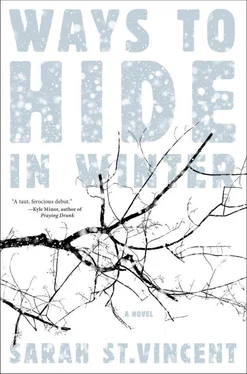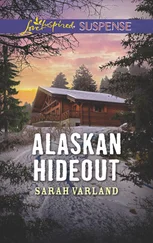Sarah St.Vincent
WAYS TO HIDE IN WINTER
The last of the deer hunters had come through for the day, and I was closing the store, counting the cash and watching the snow turn the gravel parking lot into a dappled expanse of white on gray. Someone had abandoned a car there a few weeks back, an ancient brown Subaru that was gradually succumbing to a shroud of whiteness, its tires deflating. A silence wound its way through the pines, slipping on the hidden, frozen creeks, drifting quickly on the wind. The hunters brought it in on their boots, brushed it from their hats, felt the remnants of it on their lips and fingers. When they ordered, the words were soft and gruff, as if this were no place for sound.
There was an old plastic broom on the porch, and I used it to knock the snow off the metal signboard before dragging it inside. Sandwiches, it announced. Ice Cream. Hot Coffee. Illustrated with silhouettes of a steaming mug, a man’s hand giving a thumbs-up. The porch, with its picnic tables balanced carefully on eroding cement, was covered in a layer of dirt, a few spots of ash where the hunters sat if they didn’t feel like leaving the cold. They would hunch there in their thick jackets, faces looking ageless behind their beards as they smoked. Sometimes for minutes, sometimes for hours, they would stay there, gazing at the old iron smelter that stood just down the hill, exposed to the elements, its proud limestone chimney slowly crumbling and falling.
There were still a few trail-hikers in the forest, too, the diehards, mostly retired men with time on their hands, even though it was dangerous to venture into the park at this time of year. The trails were overgrown, their markers obscured by snow, and the hunters—cautious as they were—had been known to mistake many things for deer.
I left the sign swinging in a corner and moved behind the counter. Outside, the snow was growing thicker, and I knew I should go—should have left hours earlier, in fact. I lifted the half-full coffeepot from the burner with my right arm—the good one—and tilted it over the sink, but then paused. On the other side of the window, the clouds seemed to trap the light against the earth, reflecting it from snow to cloud and back again, prolonging the dusk. The wind stirred the tops of the pines, making them ripple against the sky, bending and rising under the great invisible thing that moved them, as if they were underwater.
Watching them, the coffeepot heavy in my hand, I leaned against the edge of the sink. The wind grazed the edges of the building, humming. I chewed my lip.
Then, reaching for a styrofoam cup, I poured in a stream of the black liquid, dumped in a spoonful of sugar, and went out.
The store had once been a stable and was long and narrow, made from blocks of limestone probably hauled in from the quarries that had been just down the road. Standing under the low wooden roof of the porch, I leaned back against the wall, sipping the coffee and looking out over the mountains. Below me, the empty trail unfurled along the edge of a steep drop, past the fallen smelter and vacant campground, on its long, forbidding march from Maine to Georgia. Up the hill, the windows in the two-story brick hostel were all dark, giving the place a grim, haunted look; the manager, I knew, had left that morning to visit his mother in town, and there hadn’t been a guest in weeks. The summer cabins up the road were similarly empty, surrounded by walls of stacked, frozen cordwood. Viewed from above, their roofs, like the store’s and hostel’s, would have looked like lost islands in a river of trees.
A cold tongue of wind touched my face, and I felt the familiar ache in my shoulder. Planting a hand in my pocket, I took another swallow of coffee. A car passed by on the state road just up the slope, sending vibrations through the hard, frozen air.
When it was gone, the park once again wrapped itself in stillness. Even now, in 2007, this was a corner of the world that had been left in peace, tucked away in the forgotten forests of Pennsylvania, high in the northernmost tendrils of the Blue Ridge Mountains. In my great-grandfather’s time, the two quarries up here had crawled with the to-and-fro of laborers; now, they were just a pair of lakes where, if you were to stand on the bottom, you could look up and see the legs of swimmers and the bottoms of aimless canoes. Or at least, that’s what you would see in the summer. At this time of year, you would be trapped under a foot of ice and—more often than not—the only other person for miles around would be me.
Finishing the dregs of the coffee, I crushed the cup and went in, plucking a dirty ashtray from one of the tables as I passed. The door banged shut behind me.
I slipped my library book into my purse and turned in a circle, making sure everything was turned off, the grill and the coffee machine and the deep-fryer that left my skin smelling like hot oil. My eyes swept over the small space, skimming past the blurred reflections of the young woman with the pointed elbows who turned with me.
Of course, everything was turned off. I had never forgotten.
Just as I was reaching into my pocket for the keys, the door hinges groaned behind me. Jumping in surprise, I spun to face the front of the store, realizing even as I did it that I was moving much too quickly, making a mistake. Pain sang through my hip and shot down my arm in a dart, hard and searing, the shock of it running through me like a blade.
Gasping and bending nearly double, I found myself standing with my back against the grill, staring at a wide-eyed stranger.
“Please don’t scream! I’m so sorry. Please don’t scream.”
The stranger was tall and thin, wearing jeans and a padded brown jacket that was much too large for him, black hair protruding from under a dirty knit cap, a scarf wrapped over his nose and mouth. His hands were bare and half-raised, as if in surrender.
“What do you want?” I asked. My hip throbbed, and I gripped it with both hands, pressing down against the muscles that had seized over the bone. The pain sent a cloud across my vision, harsh and blue and electric, and for a moment I thought I would have to kneel on the floor.
The stranger’s eyes were wide and black above the scarf. “I’m very sorry. Are you all right?”
With an effort, I nodded.
“I saw the light on,” he continued, obviously alarmed. “I thought your store was open.”
“It’s not my store. And it’s closed.” Facing him, I caught my breath. “What were you coming in for?”
“Nothing, nothing—please don’t worry about it.” He lowered his palms and glanced around, seeming to take in the shelves of insect repellent and canned sausages, the ice cream case, the telephone that had been dead since the fire. “I was just looking for something hot to drink.”
I gave him a long, doubtful look, keeping a grip on my side as I slowly straightened. “We’re closed,” I said again.
“I’m very sorry. I can see I’ve inconvenienced you.” He stepped backward, reaching behind him and fumbling for the knob. His accent sounded foreign, the words rounded and stumbling, dropping like marbles. “I’ll come in tomorrow.”
“It’s Saturday. We’re not open tomorrow.” I drew a breath. He was extraordinarily slim, a pale slice of a person, with a high voice and raised eyebrows. A musty smell seemed to emerge from his coat when he moved. “Is there something you need?”
Читать дальше













